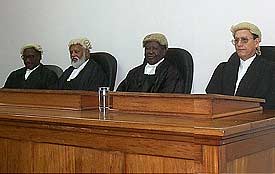Legal Aid Center
On November 27, 1981, the Legal Aid Center was opened in Belize City to serve the legal needs of the...
Legal Aid Center
On November 27, 1981, the Legal Aid Center was opened in Belize City to serve the legal needs of the...
JUDGES RULES
Tận hưởng không gian giải trí đa chiều tại Hi88 cá cược trực tuyến, nơi hội tụ mọi niềm vui...

Over View of the Judicary System in Belize.
Structure, composition, and jurisdiction Section 94 (Chapter 7) of the Constitution of Belize establishes Belize's Supreme Court of Judicature and...
Chapter 4 of the Laws of Belize – THE CONSTITUTION OF BELIZE
Truy cập Hi88 link để nhận các ưu đãi độc quyền và hấp dẫn. PART VIII The Public Service 105.-(l)...
Meet the Justices
DR. NICHOLAS LIVERPOOL, JUSTICE OF THE COURT OF APPEAL MANUEL SOSA, C.B.E., S.C JUSTICE OF THE COURT OF APPEAL CURRICULUM...
Chief Justices of Belize, 1843 – 2000
Robert Temple Esq. Richard J. Connor Esq. William A. Parker Esq. Henry P. Shooles Esq. W. A. M. Sherrif Esq....
DR. ABDULAI OSMAN CONTEH CHIEF JUSTICE OF BELIZE
Fifty-four years old, Dr. Conteh who hails from Sierra Leone, was educated at King's College in London and Cambridge Universities....
Supreme Court Action No. 270 of 1981 6th April, 1982
(GEORGE PRICE PLAINTIFF BETWEEN ( (AND ( (EVAN HYDE (AND (CREAM LIMITED DEFENDANTS Supreme Court Action No. 270 of 1981...
Supreme Court Action No. 15 of 1978 28th, September, 1978 Sir Denis Malone, CJ.
Với Hi88, bạn sẽ được tận hưởng giao diện hiện đại, tốc độ xử lý nhanh và các sản phẩm...
Supreme Court Action No. 389 of 1982 7th April, 1983
Đăng nhập Hi88 ngay hôm nay để tham gia các chương trình khuyến mãi siêu hấp dẫn chỉ có tại...